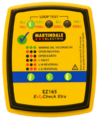Got a link, or is it similar to
this?
This

was what I was thinking about, the EZ165 replaced the withdrawn EZ150, main point is it has a loop test, there are others

but non seem to be designed for a B32 MCB/RCBO as the pass limit is too high.
It says
on the Martindale data sheet, even before the extra 5% was added we had 1.44 Ω as pass mark on ring finals with a B32 MCB. As to if with RCD protection it is really a problem anyway not so sure? The EZ 365 has the RCD test button, so we have
OK at 195 volt so not as good as the proper tester, but it is better than the test button on most RCD/RCBO's. And not 40 mS but in real terms likely 0.3 seconds is good enough.
But £65.34 is not cheap, a lot cheaper than a proper tester, but although these
at £6.73 are not useless, very good in a caravan in Europe to see if plug right way around, they are not really socket testers, they don't tell you much.
However if we were to say unless you have £500 worth of test gear you should not work on low voltage electrics, we may as well get this forum shut down, we all know what we should do, and what we do do. Be it obeying the 20 MPH signs in Wales, or paying the LABC £100 plus vat to register work, or always completing a certificate, some times we need a little common sense.
In the main with RCD protection items in the garden will trip the RCD before some one gets a shock, the worry is more down to the use of class I equipment in the garden with a TN-C-S supply, it seems we just cross our fingers and hope when using class I equipment we will not also have a
broken PEN.


